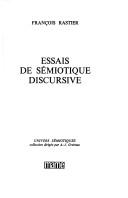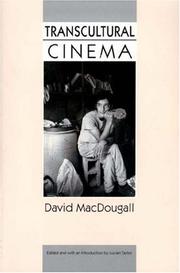| Listing 1 - 7 of 7 |
Sort by
|
Dissertation
Year: 1993 Publisher: Liège : Université de Liège [ULg], Faculté de Philosophie et Lettres,
Abstract | Keywords | Export | Availability | Bookmark
 Loading...
Loading...Choose an application
- Reference Manager
- EndNote
- RefWorks (Direct export to RefWorks)
linguistique --- linguistique --- semiotique --- denotation
Book
ISBN: 9782722601994 Year: 2013 Publisher: Collège de France
Abstract | Keywords | Export | Availability | Bookmark
 Loading...
Loading...Choose an application
- Reference Manager
- EndNote
- RefWorks (Direct export to RefWorks)
It is quite possible that the attacks to which the traditional notion of meaning has been subjected, from various sides, and the appearance of a whole series of doctrines or tendencies which could be grouped under the convenient general designation of " semantic skepticism ”appear afterwards as having constituted one of the major events, not to say the major event, of the philosophy of the second half of the twentieth century. By "semantic skepticism", I mean an attitude which can range from the simple challenge of the possibility of submitting a notion like that of "meaning" to a theoretical treatment appropriate to the outright negation of the existence of semantic facts that it might be a question of explaining with the help of some theory.On the other hand, it is only too fair to note that the recent period has also been distinguished, on the other hand, by forms no less typical of exaggerated confidence in the possibilities that the theory of signification offers to philosophy today. - the most remarkable of which being represented by the idea, of which Michael Dummett will have been the most convinced and the most talented defender, that the theory of meaning could have reached since Frege the status of new paradigm of first philosophy .
Languages & Literatures --- Philology & Linguistics --- scepticisme sémantique --- référence --- Saul Kripke --- dénotation --- Gottlob Frege --- Ludwig Wittgenstein --- signification --- Michael Dummett

ISBN: 2250005710 9782250005714 Year: 1973 Publisher: Tours Mame
Abstract | Keywords | Export | Availability | Bookmark
 Loading...
Loading...Choose an application
- Reference Manager
- EndNote
- RefWorks (Direct export to RefWorks)
Discourse analysis --- -Discourse grammar --- Text grammar --- Semantics --- Semiotics --- Addresses, essays, lectures --- -Addresses, essays, lectures --- -Semeiotics --- Semeiotics --- Semiology (Linguistics) --- Signs and symbols --- Structuralism (Literary analysis) --- Discourse grammar --- Literary semiotics --- Analyse du discours --- Sémiotique --- Dénotation (linguistique). --- Sémiotique et littérature. --- Analyse du discours narratif. --- Semiotics. --- Discourse analysis. --- Dénotation (linguistique) --- Dénotation (linguistique) --- Sémiotique et littérature.
Book
ISBN: 2804112667 9782804112660 Year: 1989 Publisher: Bruxelles De Boeck-Wesmael
Abstract | Keywords | Export | Availability | Bookmark
 Loading...
Loading...Choose an application
- Reference Manager
- EndNote
- RefWorks (Direct export to RefWorks)
Deux parties: introduction théorique et technique à la logique formelle; introduction à la philosophie du langage et de la logique.
Mathematical logic --- Logic. --- Wittgenstein, Ludwig, --- Logic --- Logique --- AA / International- internationaal --- 16 --- Logica. Dialectiek. --- Logica. Dialectiek --- Wittgenstein, Ludwig --- Propositional Logic --- Predicate Logic --- Intensional Logic --- Multivalued Logic --- Deontic Logic --- Philosophy --- Modal Logic --- Reference --- Intension --- Denotation --- Philosophie du langage
Book
ISBN: 0191805831 0191062030 0198744587 Year: 2017 Publisher: Oxford : Oxford University Press,
Abstract | Keywords | Export | Availability | Bookmark
 Loading...
Loading...Choose an application
- Reference Manager
- EndNote
- RefWorks (Direct export to RefWorks)
Explores why different languages have systematically different ways of saying the same thing. It focuses on adjectival predication and shows that systematic differences in the meaning of words expressing adjectival notions have systematic effects on the form of the sentences they appear in.
Semantics. --- Linguistics. --- Linguistic science --- Science of language --- Formal semantics --- Semasiology --- Semiology (Semantics) --- Language and languages --- Comparative linguistics --- Information theory --- Lexicology --- Meaning (Psychology) --- Semantics, Comparative. --- Comparative semantics --- Grammar, Comparative and general --- Semantics --- morphosyntactic variation --- property concepts --- lexical semantics --- lexical categories --- qualities --- mass nouns --- adjectives --- semantic variation --- Denotation --- Lexeme --- Part of speech --- Predicate (grammar) --- Syntax

ISBN: 0691012342 0691012350 9780691012346 Year: 1999 Publisher: Princeton, N.J. Princeton University Press
Abstract | Keywords | Export | Availability | Bookmark
 Loading...
Loading...Choose an application
- Reference Manager
- EndNote
- RefWorks (Direct export to RefWorks)
David MacDougall is a pivotal figure in the development of ethnographic cinema and visual anthropology. As a filmmaker, he has directed in Africa, Australia, India, and Europe. His prize-winning films (many made jointly with his wife, Judith MacDougall) include The Wedding Camels, Lorang's Way, To Live with Herds, A Wife among Wives, Takeover, PhotoWallahs, and Tempus de Baristas. As a theorist, he articulates central issues in the relation of film to anthropology, and is one of the few documentary filmmakers who writes extensively on these concerns. The essays collected here address, for instance, the difference between films and written texts and between the position of the filmmaker and that of the anthropological writer.In fact, these works provide an overview of the history of visual anthropology, as well as commentaries on specific subjects, such as point-of-view and subjectivity, reflexivity, the use of subtitles, and the role of the cinema subject. Refreshingly free of jargon, each piece belongs very much to the tradition of the essay in its personal engagement with exploring difficult issues. The author ultimately disputes the view that ethnographic filmmaking is merely a visual form of anthropology, maintaining instead that it is a radical anthropological practice, which challenges many of the basic assumptions of the discipline of anthropology itself. Although influential among filmmakers and critics, some of these essays were published in small journals and have been until now difficult to find. The three longest pieces, including the title essay, are new.
Ethnology. Cultural anthropology --- Film --- Documentary films --- Motion pictures in ethnology. --- History and criticism. --- Motion pictures in ethnology --- History and criticism --- Cinéma en anthropologie sociale et culturelle --- Documentaires --- Histoire et critique --- PERFORMING ARTS / Film & Video / History & Criticism. --- Akazama. --- Ananas. --- Ballantyne, Tanya. --- Baruya Muka Archival. --- Bhumbra, Jaswant Singh. --- Blue, James. --- Bresson, Robert. --- Brown, Quentin. --- Bunuel, Luis. --- Caldwell, Erskine. --- Cantrill, Corinne. --- Chakrabarty, Dipesh. --- Dali, Salvador. --- Familiar Places. --- Geddes, William. --- German expressionism. --- Greek tragedy. --- Gurrmanamana, Frank. --- Hemingway, Ernest. --- Hollywood. --- Jarmusch, Jim. --- Kabuki theatre. --- Leacock, Richard. --- Lunacharsky, Anatoli. --- absence. --- aesthetics. --- anthropological writing. --- anthropology. --- chronophotography. --- cognitive science. --- collaboration. --- conflict structure. --- connotation. --- consciousness. --- contextualization. --- denotation. --- dialogue. --- documentary film. --- embodiment. --- epistemology. --- ethnocentrism. --- ethnography. --- film editing. --- film structure. --- filmmaking encounter. --- freeze-frame. --- history. --- identification. --- illustrative films. --- indigenous media. --- intersubjectivity. --- kinesics. --- logocentrism. --- Anthropologie --- Ethnologie --- Visuelle Medien --- Moving-pictures in ethnology --- Visual anthropology --- Documentary films - History and criticism
Book
ISBN: 0691064369 9781400857111 1400857112 0691100969 9780691615844 9780691064369 9780691100968 0691615845 0691643229 Year: 1980 Publisher: Princeton (N.J.): Princeton university press
Abstract | Keywords | Export | Availability | Bookmark
 Loading...
Loading...Choose an application
- Reference Manager
- EndNote
- RefWorks (Direct export to RefWorks)
A reader may be in" a text as a character is in a novel, but also as one is in a train of thought--both possessing and being possessed by it. This paradox suggests the ambiguities inherent in the concept of audience. In these original essays, a group of international scholars raises fundamental questions about the status--be it rhetorical, semiotic and structuralist, phenomenological, subjective and psychoanalytic, sociological and historical, or hermeneutic--of the audience in relation to a literary or artistic text.Originally published in 1980.The Princeton Legacy Library uses the latest print-on-demand technology to again make available previously out-of-print books from the distinguished backlist of Princeton University Press. These editions preserve the original texts of these important books while presenting them in durable paperback and hardcover editions. The goal of the Princeton Legacy Library is to vastly increase access to the rich scholarly heritage found in the thousands of books published by Princeton University Press since its founding in 1905.
Literature --- Authors and readers. --- Books and reading. --- Reader-response criticism. --- Authors and readers --- Books and reading --- Reader-response criticism --- 028 --- 82.085.43 --- 82.09 --- Reader-oriented criticism --- Reception aesthetics --- Criticism --- Reading --- Appraisal of books --- Books --- Choice of books --- Evaluation of literature --- Reading, Choice of --- Reading and books --- Reading habits --- Reading public --- Reading interests --- Reading promotion --- Readers and authors --- Authorship --- 028 Lezen. Lectuur --- Lezen. Lectuur --- 82.085.43 Literaire receptie --- Literaire receptie --- 82.09 Literaire kritiek --- Literaire kritiek --- Appraisal --- Evaluation --- Languages & Literatures --- Literature - General --- A Book Of. --- Allegory. --- Allusion. --- Archetype. --- Author. --- Book design. --- Book. --- Character (arts). --- Comparative literature. --- Connotation. --- Consciousness. --- Contextualism. --- Copying. --- Critical reading. --- Criticism. --- De se. --- Deconstruction. --- Denotation. --- Discourse analysis. --- Epigraph (literature). --- Essay. --- Etymology. --- Exemplum. --- Explanation. --- Exposition (narrative). --- Facsimile. --- Fiction. --- Foreword. --- Genre. --- Hermeneutics. --- Iconology. --- Ideogram. --- Imagery. --- Implied author. --- In Parenthesis. --- Inference. --- Information theory. --- Interaction. --- Interpretant. --- Irony. --- J. Hillis Miller. --- Jacques Derrida. --- Jonathan Culler. --- Juvenal. --- Language and thought. --- Language interpretation. --- Lexicography. --- Linguistic system. --- Linguistics. --- Literariness. --- Literary criticism. --- Literary theory. --- Literature. --- Manuscript. --- Mental space. --- Metaphor. --- Narration. --- Narrative structure. --- Narrative. --- Narratology. --- Notation. --- Novel. --- Obfuscation. --- Phraseology. --- Poetry. --- Politique. --- Preface. --- Presupposition. --- Prose. --- Publication. --- Reading (process). --- Relativism. --- Rhetoric. --- Roland Barthes. --- Role-playing. --- Scholasticism. --- Semiotics. --- Sentence function. --- Speech act. --- Stylistics (field of study). --- Terminology. --- Textual criticism. --- Textuality. --- The Cult of the Self. --- The Purloined Letter. --- The Various. --- Theory of Literature. --- Theory. --- Thought. --- Train of thought. --- Transcoding. --- Transformational grammar. --- Treatise. --- Verb. --- Verisimilitude. --- Working hypothesis. --- Writer. --- Writing process. --- Writing.
| Listing 1 - 7 of 7 |
Sort by
|

 Search
Search Feedback
Feedback About UniCat
About UniCat  Help
Help News
News